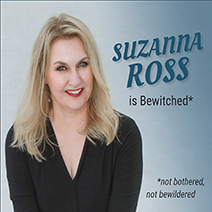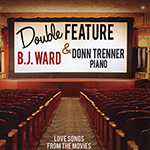Suzanna Ross
Suzanna Ross is Bewitched*
*Not Bothered, Not Bewildered
May 5, 2020
by Jerry Osterberg

Suzanna Ross’ debut album has much sophistication. The inspired range of songs, nothing if not eclectic, features not only many of the most glorious American songwriters to have ever walked the floors of Tin Pan Alley—Jerry Bock, Richard Rodgers, Oscar Hammerstein II, Johnny Mercer, Harold Arlen, and E.Y. Harburg—but some marvelous French composers and lyricists including Charles Aznavour, Michel Legrand, Francis Lai, Jacques Diéval, and Serge Gainsbourg.
As a storyteller Ross is comfortable within a variety of genres, from jazz to French chansons, and displays believability in all of them. From the opening, it appears that she has been influenced by Peggy Lee, whose aura is evident in several songs, especially “Bewitched,” “My Favorite Things,” “Laura,” and the obvious “Mr. Wonderful,” a hit not only for Lee, but for Sarah Vaughan and Teddi King in 1956. In the hands of Ross, “Mr. Wonderful” is more than credible.
“My Favorite Things” and “Laura” are both winning presentations, the former featuring a soft swinging bass solo by Skip Ward. This was a prime example of the many opportunities for the musicians to have their moments. It’s always a good thing when a vocalist has the confidence to stand back. It shows respect for both the piece and the musicians. Not only was the arrangement by Gregory Toroian for “Laura” striking, but Ross’ vocal was superb! Toroian opened with an elegant piano solo, creating a dreamlike and mysterious atmosphere that invoked the suspenseful film noir. Ross transitioned smoothly, commanding attention as she painted images that became increasingly more visual. There was no attempt to add unnecessary drama to Johnny Mercer’s brilliant lyrics. Even for those who have never seen the song’s film namesake Laura, it was apparent that Laura was an enigma desperate to be solved.
For this listener, a highpoint of the recording was the inclusion of songs rendered in French. As with a Puccini opera in which the English version of the Italian often describes mundane activities, French is a lyrically sounding language, occasionally better left untranslated. Here are a trio of songs that could illustrate that opinion. “For Me Formidable” (Charles Aznavour, Eugene Lees, Jacques Plante), is about a cocky street nuisance who is a bit too frank, perhaps more than his opposite would prefer: “Wonderful, wonderful. You were wonderful, I was pathetic. You know in life there’s no bad guys or good guys.” “Ces petits riens” (Serge Gainsbourg) and “Parlez-moi de lui” (Jacques Diéval, Michel Rivgauche) all had more in common than not. The first is about a love affair about to expire: “Better think of nothing, than think of you. It’s those little things. Those little things that I got from you.” In the second, the narrator is a rejected woman, somewhat obsessed by what her former lover is up to: “Talk to me about him. He is my whole life. Even if it hurts me, talk to me about him.” Clearly, it’s best to stick with the French as Ross did. She conveys all the flippant attitude, irony, and hysterics implicit in the Pigalle-worthy chansons, and has plenty of strong musical support by the band—Toroian and Ward, as well as David Silliman on drums. One can almost inhale the scent of Gauloises in the air.
The final third of the album gives a nod to French cinema in the heady 1960s by way of “Live for Life” (Francis Lai/Norman Gimbel) for the successful film Vivre Pour Vivre, directed by Claude LeLouch and starring Yves Montand, Candice Bergen, and Annie Girardot. The English version of the song has been recorded by many American artists. It’s a beautiful tune even without the French lyrics, and an excellent choice by Ross to include it. Finally, with tender piano accompaniment, Ross performs the verse of “Over the Rainbow” in English before switching into the French, and back to English in the final chorus. For those who have never heard it performed this way, “L’arc en ciel” is stunning.
Suzanna Ross made several wise decisions in creating her first CD. Gregory Toroian, her music director and arranger, has worked with many recording artists over the years, including Tony Bennett, Jon Hendricks, Cab Calloway, Donna Summer, Melissa Errico, Jane Olivor, and, most recently, cabaret performers Nancy Stearns and Sue Matsuki, all of whom are good company. Another wise choice was the choice of material and the stellar assembly of musicians. Having chosen standards from the American Songbook, together with a collection of quirky French songs, all well-suited to her voice and style, Suzanna Ross reached back to early memories of the music she heard while growing up. This may well have been what makes her debut recording so special.




